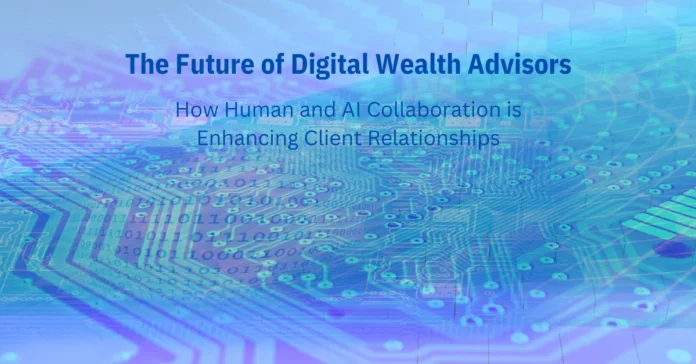As the world of wealth management evolves, the rise of digital wealth advisors—powered by artificial intelligence (AI)—is reshaping the relationship between financial professionals and clients. While AI is often seen as a disruptor, it’s becoming clear that the future of wealth management lies in human-AI collaboration rather than AI replacing human advisors altogether. This hybrid model is allowing wealth management firms to provide more personalized, efficient, and scalable services to a broader range of clients. But what does this mean for the future of digital wealth advisors?
The Role of AI in Wealth Management
Artificial intelligence has already proven its value in wealth management by automating tasks that once required significant human input, such as:
- Portfolio optimization: AI can analyze vast amounts of data to determine the optimal asset allocation based on a client’s risk profile and financial goals.
- Market prediction: Machine learning algorithms analyze historical market data and trends to generate investment insights and predictions.
- Personalized recommendations: AI-powered systems can tailor investment advice to individual clients based on their preferences, behaviors, and long-term goals.
These capabilities are enabling wealth management firms to handle a higher volume of clients with greater efficiency, accuracy, and cost-effectiveness.
The Value of Human Advisors in the Digital Age
Despite the power of AI, human advisors continue to play an essential role in wealth management. Here’s why:
- Emotional intelligence and trust: Wealth management isn’t just about numbers; it’s about people. Clients often rely on their financial advisors for guidance during stressful moments—such as market downturns or significant life events like retirement, divorce, or the passing of a loved one. Human advisors bring empathy, emotional intelligence, and the ability to navigate complex emotional dynamics that AI is not equipped to handle.
- Complex decision-making and judgment: While AI can analyze data, human advisors excel at providing judgment in situations where the data may not tell the full story. For example, a client’s personal circumstances, values, and future goals may require nuanced advice that goes beyond data points and algorithms.
- Building and maintaining relationships: Trust is the cornerstone of successful wealth management. Human advisors can foster long-term relationships with clients, providing them with tailored financial advice and offering reassurance during times of market uncertainty.
How AI is Enhancing Client Relationships
Rather than replacing human advisors, AI is enhancing their ability to connect with clients and deliver personalized advice more effectively. Here’s how:
- Data-Driven Insights: AI tools help wealth managers gain deeper insights into their clients’ financial situations. AI can analyze spending habits, investment patterns, and even lifestyle preferences, providing advisors with valuable information to offer proactive advice and anticipate needs before clients ask.
- Automated, Customized Communications: AI-powered platforms can send tailored updates, market reports, and investment suggestions to clients on behalf of human advisors. This can enhance the client experience by providing more timely and relevant information, while human advisors remain the trusted point of contact for more complex decisions.
- Scaling Advice: AI can help human advisors scale their practice by taking over routine tasks such as rebalancing portfolios or responding to frequently asked questions. This allows the human advisor to focus on higher-value, strategic activities that deepen the client relationship and add more value.
Hybrid Models: The Best of Both Worlds
The future of wealth management will likely center around hybrid advisory models, where both AI and human advisors collaborate to deliver the best possible client experience. This model can combine the strengths of each:
- AI for Efficiency: AI can streamline back-office tasks, manage large volumes of data, and provide analytics that help advisors deliver better financial strategies.
- Humans for Personalization: Human advisors can use AI insights to craft personalized strategies based on a client’s unique needs and preferences, creating a deeper, more meaningful relationship.
For example, an AI tool could provide an advisor with a detailed analysis of a client’s portfolio and highlight areas of potential risk. The human advisor would then use this information to have a strategic conversation with the client, suggesting adjustments based on their goals, preferences, and risk tolerance.
Key Benefits of Human-AI Collaboration in Wealth Management
- Enhanced Efficiency: By automating routine tasks, AI frees up human advisors to focus on higher-level strategy and relationship-building, leading to greater efficiency in client management.
- Better Personalization at Scale: AI allows wealth management firms to serve more clients without sacrificing the level of personalization that high-net-worth individuals expect. For instance, AI can automatically adjust investment recommendations based on real-time market conditions, while human advisors offer context and interpretation.
- Improved Client Engagement: With AI-driven insights, human advisors can engage clients more proactively, offering timely advice based on predictive analytics. For example, AI might flag a potential market downturn, prompting the advisor to check in with clients who may be affected.
- Reduced Costs and Increased Access: AI can help lower the cost of wealth management services, enabling firms to offer advisory services to a broader range of clients, including those with smaller portfolios who may not have had access to traditional wealth management before.
Challenges to Overcome
While the collaboration between AI and human advisors offers immense promise, there are challenges to address:
- Data privacy and security: As AI tools rely heavily on client data, wealth management firms must ensure robust security protocols to protect sensitive financial information.
- Trust in AI: Some clients may remain skeptical about AI-driven advice, particularly when it comes to complex financial decisions. Human advisors will need to ensure that clients feel confident in the use of AI tools.
- Ethical considerations: AI algorithms must be transparent and free from biases, particularly in how they make recommendations and use client data.
Looking Ahead: The Future of Digital Wealth Advisors
The convergence of AI and human expertise will likely become a hallmark of wealth management in the coming years. As AI tools continue to evolve, they will provide even more sophisticated insights and solutions, enabling human advisors to offer tailored, high-touch service to clients on a larger scale. Ultimately, it’s the combination of human judgment and AI-powered efficiency that will create the most compelling and sustainable wealth management models.
In the near future, we can expect a shift towards more digital-first wealth management experiences, with AI playing a critical role in scaling personalized advice while human advisors remain at the core of relationship-building and complex decision-making. WealthTech firms that embrace this hybrid model will be best positioned to meet the needs of clients in an increasingly digital world.


